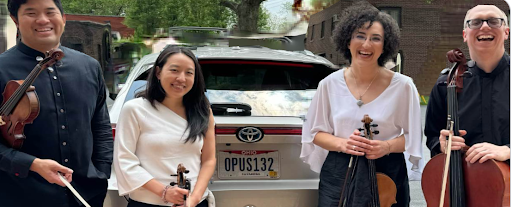by Daniel Hathaway
The original plan for the season finale of Arts Renaissance Tremont called for the Cavani Quartet — joint artistic directors of the series at St. Wendelin Church — to join the Verona Quartet, Oberlin Conservatory’s resident string quartet, to form an octet. But when a member of the Cavani became indisposed, the Verona agreed to play the whole program on Sunday afternoon, May 5.
Although the audience at St. Wendelin might have been surprised by the change in plans, nobody could possibly have been disappointed. Violinists Jonathon Ong and Dorothy Ro, violist Abigail Rojansky, and cellist Jonathan Dormand gave revelatory accounts of Mendelssohn’s first and Beethoven’s fifteenth quartets. And they very likely introduced all but a few cognoscenti in the audience to the fascinating music of Grażyna Bacewicz with the Fourth Quartet by the Lithuanian-Polish violinist and composer, who lived from 1909 to 1969.
The Mendessohn made a delightful opener, immediately establishing the Verona’s classy, lyrical playing and gorgeous blend. Ong’s expressive third-movement solo grew into intense passion, relieved in the finale by the composer’s signature joyfulness, a quality the Verona drove home with festive articulation and effervescent playing.
The opening movement of the Bacewicz manages to reconcile French salon music with hints of Bartók. Shimmering tremolos in the upper strings and lyrical melodies in the cello led to a thundering conclusion.
The Verona fully invested themselves in Bacewicz’s lush, mysterious harmonies in the middle movement and, deftly passing lines back and forth, brought the perpetuum mobile finale to a smashing conclusion amid high harmonics and pizzicati.
Cavani primo violinist and founder Annie Fullard, who emceed the performance, noted that Beethoven’s next-to-last quartet is a perennial favorite of string players and audiences alike. She invited the audience to visit the parking lot to view evidence of her own esteem for the piece (photo above).
This quartet was also personally emotional for the composer, who embedded in its third movement a “Holy song of thanksgiving of a convalescent to the Deity, in the Lydian mode” for his deliverance from a life-threatening illness. But first came a powerful and well-balanced opening movement, its many mood shifts sensitively delineated by the Verona.
Rojansky and Dormand joined in a lovely trio during the nicely-paced and lyrically-phrased second movement. The Verona shaped individual entrances and long lines exquisitely in the third, and when all the melodic strands came together, crafted a moment of heartrending beauty.
The quartet ends in a series of reprises both of the Heiliger Dankgesang and its opening movement — with a march and a recitative thrown in. Everything grows into the Allegro appassionato, which the Verona played with a huge and full-bodied sound. A grand finale to another impressive season.
Published on ClevelandClassical.com May 23, 2024.
Click here for a printable copy of this article
Return to the front page




